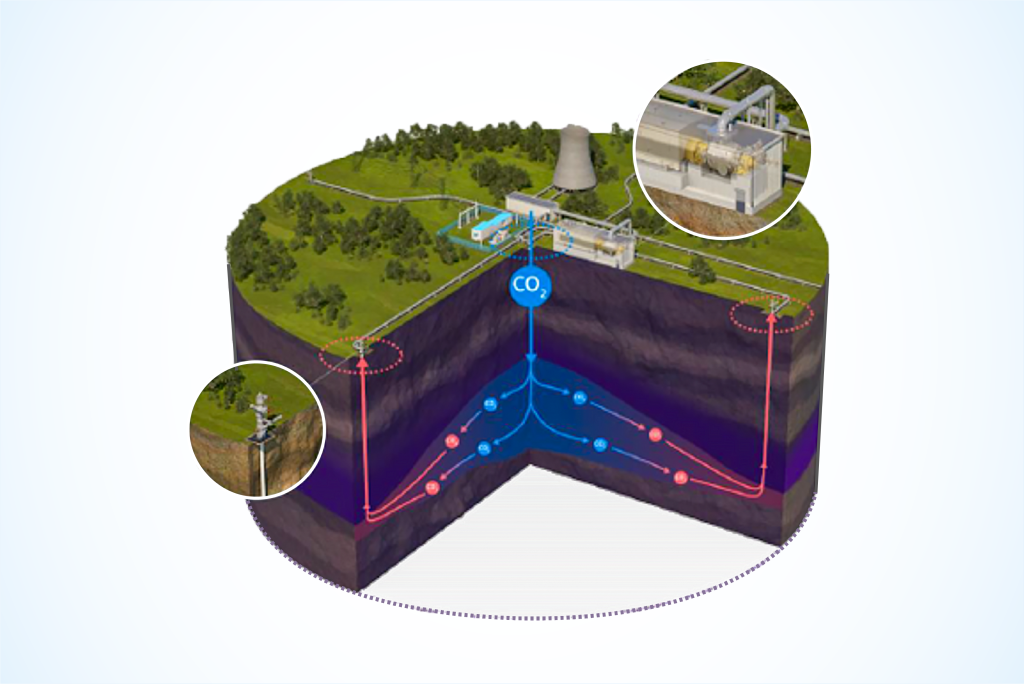
Caption: Siemens NGP Concept
Project Highlights
- Examine NextGen Geothermal Power project site section and design considerations.
- Assess the economics of an NGP demonstration project and attaching the technology to an existing facility.
- Explore the beneficial reuse of captured CO2 in support of a transitioning energy system.
Background, Objectives, and New Learnings
Both renewable energy resources and carbon capture and storage (CCS) could play important roles in decarbonizing U.S. and worldwide economies. Without energy storage, most renewable energy sources are unable to provide baseload power. CCS presents unique development and operational challenges.
Siemens Energy has implemented and field tested the NextGen Geothermal Power concept, which uses carbon dioxide (CO2) as a working fluid and stores large amounts of CO2 in the subsurface. As a form of geothermal energy, NGP takes advantage of the positive thermodynamic properties of CO2 compared to water for geothermal applications to enable baseload, emission-free power generation. In the NGP concept, CO2 is injected into high-permeability reservoirs overlain by cap rocks where the CO2 is heated by the geothermal gradient, flows to the surface, and expands in a turbine to generate electricity, after which is reinjected again (forming a “closed CO2 loop”). Siemens successfully performed a pilot test in Hungary in 2022 which achieved stable CO2 circulation, validation of calculation models, system regulation, and proof of the thermosiphon concept.
The objective of this project is to conduct a pre-feasibility analysis for a ~10MW NGP demonstration plant in the U.S. This study is expected to include:
-
Site selection (geology, CO2 source, pore space availability, etc.)
- System design analysis (surface and subsurface)
- Economic analysis of NGP demo
- Economic analysis of NPG attached to a power plant
New learning from this effort is expected to include obtaining performance and cost data (pre-FEED study) for a site-specific, ~10MW NGP plant in the U.S.
Benefits
Better understanding considerations surrounding emerging energy supply resources can help inform the development of a low-carbon energy system for the benefit of the public.
This project involves a low-carbon energy generation option, using geothermal gradients and captured CO2 to help meet customer demand and achieve net-zero goals.
This project is expected to improve understanding of geologic characteristics, cost, and risks associated with NGP project development.
Project Approach and Summary
The effort is intended to be conducted over six tasks:
Task 1. Site Selection
1.a Site screening and selection of potential sites based on subsurface characteristics, temperature, location, pore space availability, distance to the CO2 source(s) identified in tasks 1.b, etc.
1.b CO2 source analysis (availability and specifications)
Task 2. Subsurface System Design and Performance
2.a Modeling of subsurface system, including thermodynamic flow simulations of the reservoir and wellbore (injector/s and producer/s) and sensitivity analysis.
Task 3. Surface System Design
3.a Modeling of surface system.
Task 4. Economic Assessment
4.a Sensitivity analysis providing LCOE and Operational cost (fixed and variable O&M)
- Capital cost
- Utility consumption
- Fixed and Variable Operating cost
- LCOE
Task 5. Integration into Post-Combustion CCS Process
Task 6. Final Report
6.a A final report will be submitted to funding members containing cost and performance information.
Deliverables
- Technical report documenting project activities
- Presentation/discussion in key EPRI/Industry forums
Price of Project
The cost to join as a host site is $100,000, and to join as a non-host is $65,000. The project is eligible for self-directed funds.
Project Status and Schedule
The four-month project is expected to start May 31, 2024.
Estimated period of performance:
Task 1. Site Selection (Weeks 1-5)
Task 2: Subsurface System Design and Performance (Weeks 5-9)
Task 3: Surface System Design (Weeks 8-12)
Task 4: Economic Assessment (Weeks 11-16)
Task 5. Integration into Post-Combustion CCS Process (Weeks 13-15)
Task 6: Final Report (Weeks 14-16)
Who Should Join
This project is applicable to energy companies interested in exploring NextGen geothermal power or otherwise examining the beneficial reuse of captured CO2.
Contact Information
For more information, contact the EPRI Customer Assistance Center at 800.313.3774 (askepri@epri.com).
Technical Contacts
Laura Chiaramonte at 650.855.8980 (lchiaramonte@epri.com)
Abhoyjit Bhown at 650.855.2383 (abhown@epri.com)